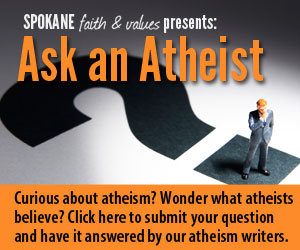What do you want to ask an Atheist? Fill out the form below or submit your question online.
By Jim Downard
What would you say to God after not believing in him your whole life?

Actually do many people believe that their God personally convivs with them in the afterlife, like a hangout buddy? An omnipresent deity could of course do that for any finite (or even infinite) number of people, but it doesn’t seem to be a typical trope in heaven thinking.
Anyway, Bertrand Russell had his own reply on that one long before I came along: ‘You should have offered better evidence.’ And still assuming we’re talking about that God of Abraham version (and not Vishnu or some other) I’d want to add I’d have plenty of questions on why the Bible goofed so on not forbidding slavery, or why God seemed so disinclined to interfere during the Inquisition or Holocaust.
Now if such questions are not permitted in the afterlife, how strange and sad would that be?
And another thing: wouldn’t it be the case that the God with whom I am to have such interactions one of these days is already aware of my typing this message now? We could have had chats long ago, I would be more than happy to have done that. But all I can see is that ancient peoples built up a god belief and modern followers fold that into their own expectations. But the god doesn’t have to be real to do that (in fact, for example, every Christian is announcing that many billions of people on earth are doing exactly that; fervently believing in gods that don’t exist).
Come to think about it, people can even imagine Sherlock Holmes exists, at least insofar as feeling they “know” the character, his actions and attitudes, and are even able to write new pastiches based on what was in fact a completely invented character. (I include Sherlock and Mycroft Holmes, and Poe’s venerable Auguste Dupin too in my “The Paralogs of Phileas Fogg” novel, so I play the game too.)
If I ever ran into Sherlock Holmes I’d want to ask him, “How come you exist at all when I’d thought you were only a fictional character?” Then maybe we could go solve a mystery somewhere.






